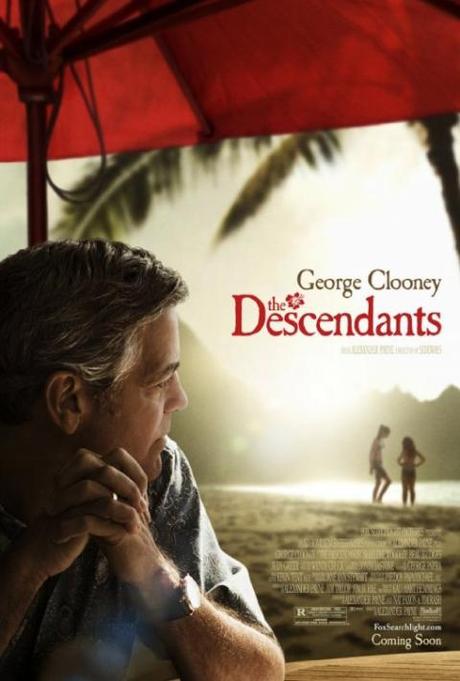
As I left the theater after viewing The Descendants, one thing became obvious while overhearing the other patrons’ after-show assessments: the movie they just watched clearly wasn’t the one they were expecting to see. They came to the film apparently anticipating some kind of broad comedy, and based on the advertising, I suppose I couldn’t blame them for feeling that way. But The Descendants isn’t that kind of film, and it was obvious that the other filmgoers, whether they enjoyed for the experience or not, weren’t quite prepared for it. The best classification I can think for a film such as this would be either “dramedy” or “seriocomedy” – emphasis placed on the “serio” – especially when you consider that the film’s chief running joke comes from characters continuously telling the lead character, Matt, how strong his wife is, and how “she’ll pull through” after her serious injury. Of course, that’s the type of encouragement other people give to make themselves feel better. In truth, Matt’s wife isn’t going to pull through, and he knows it, but never lets on. It can be called a joke because it involves someone making a fool of him-or-herself by stating something we know to be ludicrous. But not all jokes, even when told well, should inherently be funny. Sometimes, the best humor is the kind that reveals tensions more than relieves them.
If The Descendants can be called a comedy, than it may be the best comedy of the year, or at least the most profound. Based on the novel by Kaui Hart Hemmings and directed and co-written by Alexander Payne, it relates the story of Matt King (George Clooney), a successful, hard-working, affluent Hawaiian lawyer of middle age who is the sole proprietor of a trust inherited from his ancestor, a Hawaiian princess who married a Caucasian missionary. The trust is a few years away from dissolving, and Matt must decide whether to sell its last and most valuable asset – a vast acreage of unblemished Hawaiian landscape – to local land developers for conversion into resort properties and luxury beachfront housing. Matt strives for fiscal responsibility, living off the income of his law practice despite his own independent wealth, but his large extended family is not, and need the vast windfall the sale will offer. Disillusioned with Hawaii, Matt seems happy to go along with what they want; mainly, of course, because he’s unsure of what he wants himself.
Far more pressing for Matt is the situation with his wife, Elizabeth. Elizabeth was an adventurous, outdoorsy type, who took charge of raising their two daughters while Matt worked. After a severe motorboat accident, however, she’s fallen into an irreversible coma, and according to her living will, she’s must be taken off life support and allowed to die. Facing his wife’s impending death, the absentee father Matt needs to take on the responsibility of caring for his two daughters, each of whom have their own issues: the boisterous, ten-year-old Scottie (Amara Miller) is a belligerent bully to her classmates and teachers, while the rebellious, seventeen-year old Alex (Shailene Jones) lives at a boarding school because she has a history of drinking and drugs. After bringing Alex back to help him out with Scottie, she drops a bombshell on her father: his now dying wife was having an affair. Despite his angst, Matt does right by Elizabeth, informing his family and friends of everything that’s happened to her, while also becoming obsessed with confronting his wife’s lover (Matthew Lillard). Finding out that he’s staying on another island, Matt takes Alex, Scottie, and Alex’s boyfriend Sid (Brian Krause), a seemingly lunkheaded beach bum, on his trip to find and face the man, while in the process trying to get his family, and himself, through their crisis.

The King family - Alex (Shailene Woodley), Matt, Scottie (Amara Miller) - and Alex's boyfriend Sid (Brian Krause).
The Descendants covers some very familiar territory for Payne, here directing his first film in six years. Like his earlier films Election, About Schmidt, and Sideways there are themes here involving the complicated emotions of infidelity, the pain of loss, and the sudden, hard recognition of life’s disappointments. With the exception of his debut, Citizen Ruth, Payne’s films have all been about adult men living in some modern, underrepresented corner of contemporary society, and dealing with the underwhelming state of their own lives. Matthew Broderick’s school teacher from Election dealt with suburban malaise, Jack Nicholson’s eponymous Schmidt had to cope with retirement and the sudden loss of his wife, and both Paul Giamatti’s frustrated novelist and Thomas Haden Church’s fading, and philandering, television star from Sideways both had to come to grips with the fact that their lives were not going to become what they dreamed them to be. Added to the list of Payne protagonists is now Matt King, who must become a father to his daughters while confronting his grief about his wife and her infidelity. What makes Matt more relatable than most of Payne’s other protagonists is that for all his seething anger and grief, he genuinely wants to do the right thing for everyone and himself, though the ultimate brilliance of the script and its story comes from that fact that what’s right for him could be wrong for everyone else.

Clooney's Matt King represents director Alexander Payne's core archetype: a man dealing with his world being turned inside out, and uncertain of how to react.
One of the most singular qualities of Payne’s films are that they’re some of the more realistic fictional films you’re likely to see; they’re not realistic in the gritty, visceral sense of the word, though, as much they display refreshing authenticity. Payne’s characters and settings feel like real people and real places instead of the overly pristine simulacra common to mainstream filmmaking. The people inhabiting his films carry with them a few extra pounds and a few too many wrinkles. They wear the wrong clothes, the wrong makeup, and the wrong tan. They’re not always the best looking, and they’re not presented in the most flattering of situations. And most of all, they commonly display moments of genuine, often cringe-inducing awkwardness. They are, very simply, like us and everyone else we know. Payne’s known for often casting non-actors for his films, yet one of his great strengths lies in casting great actors capable of playing real people and setting them in a world that feels lived in. What perhaps proves most realistic about his characters, though, is that none of them are entirely right or wrong, good or bad. Matt King has been deeply, painfully betrayed, but he recognizes his complicity in his wife’s adultery, and that guilt tears him apart. His wife’s lover, too, isn’t a bad person, no matter how much Matt tries to make him into one; his worst actions are themselves a sharp contrast to his best intentions.

In "The Descendants," Clooney and Woodley both deliver outstanding, award-caliber performances.
Clooney’s sex symbol status and high celebrity profile too often distract from the fact that he’s honestly one of our greatest living film actors. The part of Matt King required someone who knows how to be a movie star and an actor: both a comforting, recognizable presence to whom we need no introduction, yet the nuanced, deeply moving performer who lets us inside the head of his character at all times. Clooney understands keenly how to do both, and for all the glamour he evokes in reality, he fits right in with Payne’s tapestry of authentic character-types. As his older daughter, Jones gives a particularly funny, smart, mature performance, playing to Clooney both comedic sidekick and emotional support. The film, overall, is a collection of small, expertly realized performances, beautifully realized. Lillard, greatly aged from his heyday years ago, brings a surprising amount of empathy to his small role, and Judy Greer has some very wonderful moments as his wife, whose reactions to her own husband’s infidelity differ from Matt’s, but are equally and believably painful. The perpetually underrated Robert Forster also has a fine, brief turn as Matt’s father-in-law, a gruff man whose fierce defense mechanisms hide very deep sorrows.
The Hawaii of The Descendants stands as a character all its own, and a large aspect of Matt reconnecting with his children entails him reestablishing his own ancestral connection to the islands. This is a Hawaii that’s urban and suburban, tropical and temperate, modernized and industrialized, yet at all times painfully evocative of the natural world and rich culture that modernization and commercialism have irrevocably intruded on. The film’s soundtrack is entirely either Hawaiian music or other music performed in the Hawaiian style, and the melodies lovingly evoke the longing and unspoken nostalgia for a paradise that Matt has convinced himself is lost both to him and to everyone else.

Hawaii is as much a character in The Descendants as anyone in the cast.
Where The Descendants ultimately works so well is that it feels simultaneously cinematic and novelistic, displaying wonderful visuals but also using them to speak to deeply internalized feelings and thoughts. There’s a very brilliant sequence where Clooney sits deep in anxious contemplation after learning a piece of news that causes him a crisis of conscience, while in the background a Hawaiian band plays a song that reflects his turmoil. Matt King can use this knowledge to his own emotional advantage, but it would go against everything he is as a person. Yet that fact goes unsaid by his character and otherwise unrevealed, save through the visuals, the music, the context of the writing, and Clooney’s superb, award caliber performance. Never for a moment in The Descendants did I not completely understand Matt King’s emotional state or his line of thinking; the film, rather brilliantly, made his frustrations, his agony, and finally, his own deep understanding of his situation feel in step with my own. This was a film that required my ability to interpret and identify, not just my willingness to be manipulated, and as a viewer I was very appreciative of that.
In strictest terms, though it has its moments of humor and wit, The Descendants perhaps isn’t quite a comedy in the normal way we think about it, which is something to provoke laughter. Yet it is a comedy because, despite its tragic elements, it absolutely isn’t a tragedy; it’s a film about sorrows, regrets, frustration, mourning, betrayal, and death, but its tone, if not quite lighthearted, easily avoids being ponderous and oppressive. It’s about characters searching for ways to hide or absolve their grief, not express it or revel in it, and like all good comedies, it does lead to a happy ending. Yet, if The Descendants isn’t quite what it’s advertised to be, it should be forgiven for that. After all, the only thing that its ads promised was laughter; what it actually delivers is far, far more.


